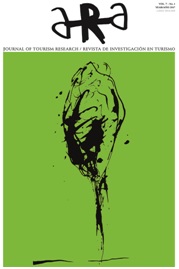Understanding enhanced tourist experiences through technology: a brief approach to the Vilnius case
Article Sidebar

Main Article Content
Ilona Beliatskaya
European Humanities University, Vilnius University, Vilnius
The present research investigates the notion of enhanced tourist experiences through technology shedding light on co-creation practices and empowerment of customers. Neuhofer and Buhalis (2013) introduced a novel concept of technology-enhanced tourist experiences by generating a joint comprehension of new era of experiences which conjoin the elements of experiences, co-creation and technology. Being one of rather promoting cities in online environment Vilnius represents an interesting case of successive adoption of smart technologies in order to enhance tourist experiences and facilitate customer empowerment in Vilnius tourism domain. This study aims to determine technology-enhanced tourist experiences in order to measure factors of customer empowerment on the example of international incoming tourists to Vilnius (Lithuania). The mix-methods approach (qualitative online content and functionality analysis and quantitative survey) was justified as being the most appropriate for the purpose of this research with intention to find a basis for applying of technology-enhanced tourist experiences in Vilnius tourism marketplace. The paper concludes with the definition of current level of ICTs application to enhance tourist experience co-creation and a discussion of practical implications of technology-enhanced tourist experiences development.
Keywords
Destination, tourist experience, co-creation, customer empowerment, ICTs
Article Details
How to Cite
Beliatskaya, Ilona. “Understanding enhanced tourist experiences through technology: a brief approach to the Vilnius case”. ARA: Journal of Tourism Research / Revista de Investigación Turística, vol.VOL 7, no. 1, pp. 17-27, https://raco.cat/index.php/ARA/article/view/341821.
Rights
Copyright
The authors who publish in ARA agree to the following terms:
- Authors retain copyright and grant the journal the right of first publication.
- Texts will be published under a Creative Commons Attribution License that allows others to share the work, provided they include an acknowledgement of the work’s authorship, its initial publication in this journal and the terms of the license.
- This material may not be used for commercial purposes.
- You may not distribute the modified material.
Attribution-NonCommercial-NoDerivatives 4.0 International (CC BY-NC-ND 4.0)